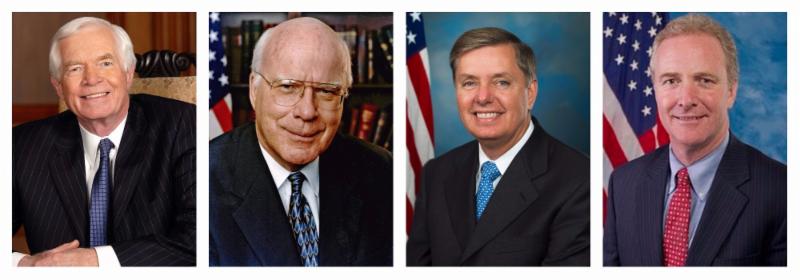Armenian Caucus Co-Chair Representative David Valadao (R-CA) spearheaded a bipartisan amendment along with Co-Chairs Reps. Frank Pallone, Jr. (D-NJ) and Jackie Speier (D-CA), House Foreign Affairs Committee Chairman Rep. Ed Royce (R-CA), and House Permanent Select Committee on Intelligence and Armenian Caucus Vice-Chair Adam Schiff (D-CA) to ensure continued funding for de-mining projects in Artsakh. This amendment was adopted as part of consideration of H.R. 3354, which consolidated numerous Fiscal Year 2018 (FY 18) appropriations bills.
Speaking on his amendment, Rep. Valadao stated: “It is a grave reality that families in Nagorno Karabakh live under the very real threat of landmine accidents each and every day.” He went on, “However, with the funding secured in my amendment, I am optimistic significant strides will be made to ensure the region is landmine free by 2020, restoring these communities so they may live without fear of mine-related accidents.”
Armenian Caucus Co-Chair Representative David Valadao (R-CA) with Armenian Assembly Western Region Director Mihran Toumajan and local Armenian American activists in a meeting last month in the Congressman’s District office in Hanford, California
Rep. Speier added: “I want to thank my colleagues in Congress for providing critically needed funding for the ongoing effort to remove deadly landmines from Artsakh. Given the danger posed to the people of this Republic – an area that suffers the highest per capita incidence of landmine accidents in the world, with a third of these casualties involving children – this modest $1.5 million amendment is destined to have a major impact on the physical and mental health of the people of Artsakh. It is also shows our government’s strong and abiding commitment to securing peace and prosperity for Artsakh, which has achieved great progress and has an even brighter future on its horizon.”
The Armenian Assembly of America (Assembly) welcomed the adoption of the bipartisan amendment. Earlier this year, Assembly Executive Director Bryan Ardouny outlined key priorities in the Assembly’s congressional testimony submitted to the House Appropriations Subcommittee on State, Foreign Operations, and Related Programs, which called for robust funding to Artsakh, including for de-mining purposes. The Assembly’s testimony to Congress stated: “For a relatively small investment, America has the opportunity to make a significant difference in the everyday lives of the people of Artsakh.”
The Assembly has a long track record of advocating for Artsakh, including the historic and first allocation of $12.5 million in humanitarian aid for the people of Nagorno Karabakh (Artsakh) “forthwith” some twenty years ago in the FY 1998 appropriations measure. In the Assembly’s testimony before the House Appropriations Committee during that time, the Assembly cited a report conducted in association with the Armenian Red Cross highlighting serious humanitarian needs, including the fact that “approximately 100,000 land mines have been laid in the interior of Nagorno Karabagh, directly threatening the lives of the population as well as an indirect threat to food production, development and the public’s health.” The Assembly concurred with the report’s findings “that there must not be further delay in providing humanitarian aid to the people of Nagorno Karabagh…”
During the run-up to the FY 1999 appropriations bill, Assembly Board Member Annie Totah reiterated the Assembly’s strong support for funding to Artsakh in her testimony to the House Appropriations Committee, and urged the Committee to “broaden the scope of assistance to Nagorno Karabagh to include rebuilding and reconstruction of infrastructure damaged in the war.”
Assembly Board Member Annie Totah at a HALO Trust facility in Artsakh in 2002
“I commend Congressman Valadao for spearheading this effort along with his colleagues, Representatives Schiff, Royce, Pallone, and Speier, for their steadfast support in buttressing the safety and well-being of the citizens of Artsakh,” stated Assembly Executive Director Bryan Ardouny. “Funding for de-mining projects helps saves countless lives, and we very much appreciate the dedicated work of The HALO Trust in helping the people of Artsakh,” he continued.
The HALO Trust has been clearing landmines and cluster munitions in Artsakh since 2000. HALO has cleared 88 percent of the territory’s minefields, with the goal to clear all landmines in Artsakh by 2020. According to The HALO Trust, Artsakh has “the highest per capita incidence of landmine accidents in the world — a third of the victims are children.”
Armenian Assembly Summer Intern Kyra Chamberlain stands next to a Smerch rocket, one of the many weapons The HALO Trust has disarmed and found while de-mining in Artsakh
The Armenian Assembly of America 2017 Summer Internship Program in Armenia interns met with The HALO Trust this summer to learn more about the deadly realities facing the people of Artsakh every day, and the life-saving work that HALO continues to carry out in Artsakh to ensure a safe environment. So far, between 2000-2016, The HALO Trust in Artsakh has destroyed 180,858 small arms ammunition; 48,572 units of “other explosive items;” 12,423 cluster bombs; 8,733 anti-personnel landmines; and 2,584 anti-tank landmines.
The Assembly has also supported de-mining in Armenia through the Marshall Legacy Institute (MLI) and their Mine Detection Dog Partnership Program (MDDPP). The program trains and delivers Mine Detection Dogs (MDDs) to landmine removal organizations within a mine-affected country. In 2002, the Assembly sponsored six MDDs for Armenia. The accomplishments of the Assembly-sponsored MDDs include clearing landmine areas in Armenia that are today used for farming, grazing, and other agricultural initiatives, as well as for transportation and infrastructure projects.
Established in 1972, the Armenian Assembly of America is the largest Washington-based nationwide organization promoting public understanding and awareness of Armenian issues. The Assembly is a non-partisan, 501(c)(3) tax-exempt membership organization.




















































